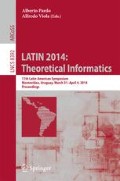Abstract
We consider the supply chain problem of minimizing ordering, distribution and inventory holding costs of a supply chain formed by a set of warehouses and retailers over a finite time horizon, that we call Production and Distribution Problem (PDP). This is a common generalization of the classical Metric Facility Location Problem and Joint Replenishment Problem, that coordinates the network design and inventory management decisions in an integrated manner. This coordination can represent significant economy for many applications, where network design and operational costs are normally considered separately. This problem is considered when the instances satisfy assumptions such as metric space of warehouse and retailer locations, and monotonic increasing inventory holding costs. In this work, we give a 2.77-approximation based on the randomized rounding of the natural mixed integer programming relaxation. Also, we give a 5-approximation for the case that objective function includes retailer ordering costs.
Access this chapter
Tax calculation will be finalised at checkout
Purchases are for personal use only
Preview
Unable to display preview. Download preview PDF.
References
Boudia, M., Prins, C.: A memetic algorithm with dynamic population management for an integrated production–distribution problem. European J. Oper. Research 195(3), 703–715 (2009)
Byrka, J., Aardal, K.: An Optimal Bifactor Approximation Algorithm for the Metric Uncapacitated Facility Location Problem. SIAM J. on Comp. 39, 2212–2231 (2010)
Chan, F.T.S., Chung, S.H., Wadhwa, S.: A hybrid genetic algorithm for production and distribution. Omega 33(4), 345–355 (2005)
Chudak, F.A., Shmoys, D.B.: Improved Approximation Algorithms for the Uncapacitated Facility Location Problem. SIAM J. on Comp. 33(1), 1–25 (2004)
Daskin, M.S., Coullard, C.R., Shen, Z.-J.: An Inventory-Location Model: Formulation, Solution Algorithm and Computational Results. Annals of Oper. Research 110(1-4), 83–106 (2002)
Levi, R., Roundy, R., Shmoys, D.B., Sviridenko, M.: A Constant Approximation Algorithm for the One-Warehouse Multiretailer Problem. Management Science 54(4), 763–776 (2008)
Li, S.: A 1.488 Approximation Algorithm for the Uncapacitated Facility Location Problem. In: Aceto, L., Henzinger, M., Sgall, J. (eds.) ICALP 2011, Part II. LNCS, vol. 6756, pp. 77–88. Springer, Heidelberg (2011)
Li, Y., Shu, J., Wang, X., Xiu, N., Xu, D., Zhang, J.: Approximation Algorithms for Integrated Distribution Network Design Problems. In: INFORMS J. Comp. (2012)
Lin, J.-H., Vitter, J.S.: ε-approximations with minimum packing constraint violation (extended abstract). In: Proc. of the Twenty-Fourth Annual ACM Symposium on Theory of Computing, pp. 771–782 (1992)
Melo, M.T., Nickel, S., Saldanha-da Gama, F.: Facility location and supply chain management – A review. European J. Oper. Research 196(2), 401–412 (2009)
Pochet, Y., Wolsey, L.A.: Production planning by mixed integer programming. Springer series in operations research and financial engineering. Springer, New York (2006)
Shen, Z.-J.: Integrated Stochastic Supply-Chain Design Models. Computing in Science Engineering 9(2), 50–59 (2007)
Shen, Z.-J., Coullard, C., Daskin, M.S.: A Joint Location-Inventory Model. Transportation Science 37(1), 40–55 (2003)
Shu, J., Teo, C.-P., Shen, Z.-J.: Stochastic Transportation-Inventory Network Design Problem. Oper. Research 53(1), 48–60 (2005)
Sviridenko, M.: An Improved Approximation Algorithm for the Metric Uncapacitated Facility Location Problem. In: Cook, W.J., Schulz, A.S. (eds.) IPCO 2002. LNCS, vol. 2337, pp. 240–257. Springer, Heidelberg (2002)
Teo, C.-P., Shu, J.: Warehouse-Retailer Network Design Problem. Oper. Research 52(3), 396–408 (2004)
Author information
Authors and Affiliations
Editor information
Editors and Affiliations
Rights and permissions
Copyright information
© 2014 Springer-Verlag Berlin Heidelberg
About this paper
Cite this paper
Pedrosa, L.L.C., Sviridenko, M. (2014). Integrated Supply Chain Management via Randomized Rounding. In: Pardo, A., Viola, A. (eds) LATIN 2014: Theoretical Informatics. LATIN 2014. Lecture Notes in Computer Science, vol 8392. Springer, Berlin, Heidelberg. https://doi.org/10.1007/978-3-642-54423-1_49
Download citation
DOI: https://doi.org/10.1007/978-3-642-54423-1_49
Publisher Name: Springer, Berlin, Heidelberg
Print ISBN: 978-3-642-54422-4
Online ISBN: 978-3-642-54423-1
eBook Packages: Computer ScienceComputer Science (R0)

